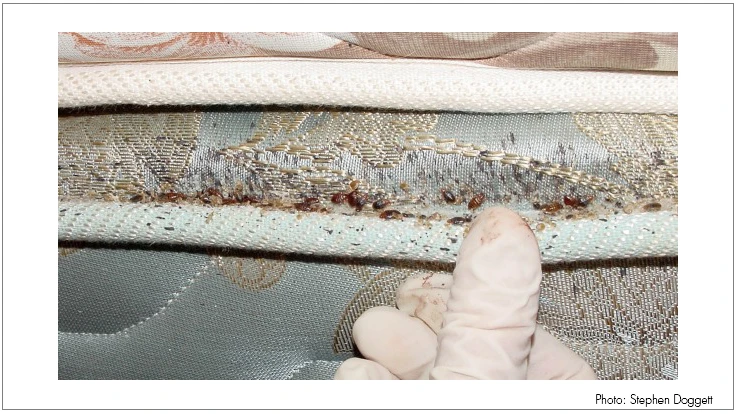
The global resurgence in bed bugs over the past two decades could be explained by revelations that bed bugs have developed a thicker cuticle that enables them to survive exposure to commonly used insecticides, according to University of Sydney research published today in PLOS ONE.
Bed bugs are blood suckers that produce intense bites and cause significant financial heartache in the hospitality and tourism sectors. Understanding why they have again become so common may help develop new strategies for their control.
Resistance to commonly used insecticides is considered the main reason for the global resurgence in bed bugs, according to University of Sydney PhD candidate, David Lilly, whose research focuses on the biological mechanisms that help bed bugs survive exposure to commonly used insecticides. Being ‘thick’ may be smart, for bed bugs at least!
“The new findings reveal that one way bed bugs beat insecticides is by developing a thicker ‘skin’, said David Lilly. “Bed bugs, like all insects, are covered by an exoskeleton called a cuticle. Using scanning electron microscopy, we were able to compare the thickness of cuticle taken from specimens of bed bugs resistant to insecticides and from those more easily killed by those same insecticides.”
Comparing the cuticle thickness of the bed bugs revealed a stunning difference: the thicker the cuticle, the more likely the bed bugs were to survive exposure to the insecticides.
The new findings could explain why failures in the control of bed bug infestations are so common. They may also unlock new pathways to developing more effective insecticides for bed bug control.
“If we understand the biological mechanisms bed bugs use to beat insecticides, we may be able to spot a chink in their armour that we can exploit with new strategies,” said Lilly.
But measuring the thickness of bed bug cuticle wasn’t an easy task, he said: “The findings are exciting but collecting data was frustrating. Taking microscopic measurements of bed bug legs requires a steady hand and patience, lots of patience.”
*****************************************
Related: Watch a video interview with David Lilly, the PhD candidate who undertook the research.
Latest from Pest Control Technology
- Donny Oswalt Shares What Makes Termites a 'Tricky' Pest
- Study Finds Fecal Tests Can Reveal Active Termite Infestations
- Peachtree Pest Control Partners with Local Nonprofits to Fight Food Insecurity
- Allergy Technologies, PHA Expand ATAHC Complete Program to Protect 8,500 Homes
- Housecall Pro Hosts '25 Winter Summit Featuring Mike Rowe
- Advanced Education
- Spotted Lanternflies, BMSBs Most Problematic Invasive Pests, Poll Finds
- Ecolab Acquires Guardian Pest Solutions





